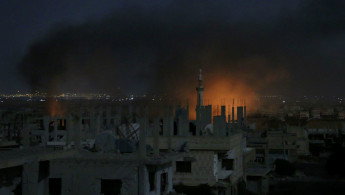Key powers thrash out safe zones plan at Syria talks
Moscow and Tehran, which back Syrian President Bashar al-Assad, and rebel supporter Ankara agreed in May to establish four "de-escalation" zones in a potential breakthrough towards calming a war that has claimed an estimated 320,000 lives since March 2011.
While fighting dropped off in the weeks after the deal, it has ratcheted up in some areas since, and the international players have yet to finalise the boundaries of the zones or determine who will police them.
In a bid to thrash out the details of the plan, participants were holding a string of closed-door meetings for a second day in Astana, with a joint session bringing together all players including the regime and rebels expected later Wednesday.
Chief Russian negotiator Alexander Lavrentiev insisted late Tuesday that the borders of two zones – in rebel-held parts of the central Homs province and around Eastern Ghouta close to Damascus – were "essentially" agreed.
But there were "still questions" about the safe zone meant to cover the Idlib province on the Turkish border and "some reservations" about another one across swathes of southern Syria, he said.
Lavrentiev raised the possibility that the sides could strike a partial deal covering just a few of the zones.
If requested Russia could send military police to patrol buffer zones between the government and rebel armies and foreign peacekeeping forces could be deployed within weeks once a deal is signed, he said.
A major sticking point still seems to be deciding which countries will ensure security in which areas, with Turkey and Iran reportedly wrangling to bolster their influence.
While Damascus has voiced its support for the de-escalation zones, rebel factions have been far more pessimistic and have slammed any Iranian involvement in the plan.
Russia has argued the agreement will provide moderate rebels with security and help focus attacks against groups such as former al-Qaeda affiliate Fateh al-Sham Front and the Islamic State group.
Syria's conflict evolved from a bloody government crackdown on protests in 2011 into to a devastating war that has drawn in world powers, including Russia and a US-led international coalition.
Russia has been pushing the talks in Astana since the start of the year. They are are intended to complement broader political negotiations the United Nations is backing in Geneva, which are due to restart next week.





 Follow the Middle East's top stories in English at The New Arab on Google News
Follow the Middle East's top stories in English at The New Arab on Google News
![The UAE is widely suspected of arming the RSF militia [Getty]](/sites/default/files/styles/image_330x185/public/2024-11/GettyImages-472529908.jpg?h=69f2b9d0&itok=Yauw3YTG)
![Netanyahu furiously denounced the ICC [Getty]](/sites/default/files/styles/image_330x185/public/2024-11/GettyImages-2169352575.jpg?h=199d8c1f&itok=-vRiruf5)
![Both Hamas and the Palestinian Authority welcomed the ICC arrest warrants [Getty]](/sites/default/files/styles/image_330x185/public/2024-11/GettyImages-2178351173.jpg?h=199d8c1f&itok=TV858iVg)